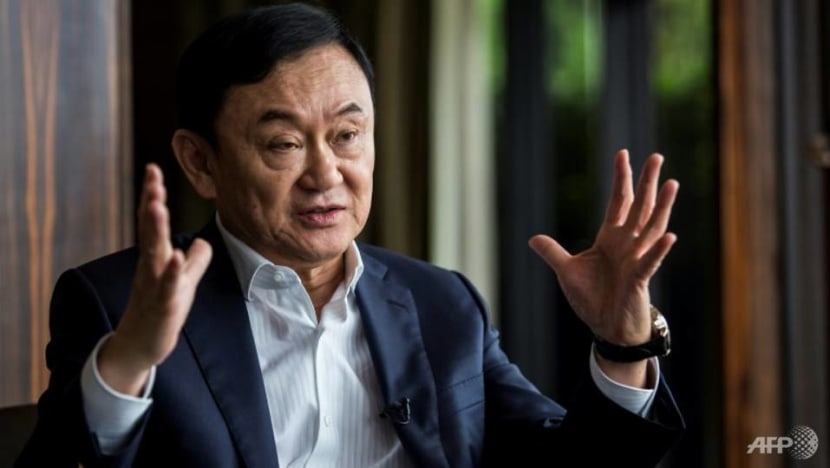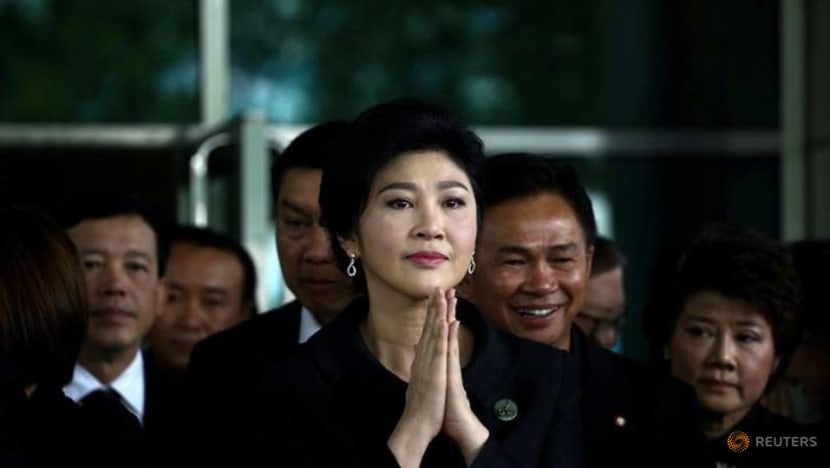Commentary: Why is former Thai PM Thaksin Shinawatra still so popular on social media?
The ousted former premier is priming himself for a return to Thai politics and this time he is betting on one demographic, says an observer.

Former Thai prime minister Thaksin Shinawatra was ousted in a 2006 coup. (Photo: AFP/ISAAC LAWRENCE)
SINGAPORE: On Aug 8, former Thai premier Thaksin Shinawatra reached out to the Thai people on social media, saying that “pi (brother) Tony” is “ready to talk to young people”.
The message, which was conveyed via his son and daughters, signals Thaksin’s return to Thai politics. The politician, who has been in self-imposed exile since 2007, looks certain to play a role in the country’s next elections.
Years after his departure from the political stage, Thaksin still holds some cachet in Thailand. Thaksin is a founder of the Thai Rak Thai Party (TRT) and the head of the first elected civilian administration to complete a four-year term in 2001-2005.
The TRT was enormously popular, especially among the rural poor. He was ousted from power by a bloodless military coup in 2006 and accused of corruption and abuse of power.
Although Thaksin has been away from Thailand for more than a decade, he continues to play a major role in Thai politics.
He established the People’s Power and Phuea Thai Parties to replace his TRT party, which was dissolved by court order. In a bid to influence elections at the local and national and local levels, he nominated relatives to serve as prime minister: Somchai Wongsawat, his brother-in-law and Yingluck Shinawatra, his sister.
Parties affiliated with Thaksin have shown consistent electoral victories, as evident in the performances of the People’s Power Party in 2007 and the Phuea Thai Party in 2011 and 2019.
In the 2019 general elections, the Phuea Thai Party, the second reincarnation of Thaksin’s TRT, was successful in a large proportion of the constituencies that it contested.
The party contested 500 parliamentary seats and was triumphant in 136 seats. The pro-military Phalang Pracharat Party won only 115 seats and the pro-democracy Future Forward Party took 80 seats.
Related:
REMARKABLY RESILIENT BRAND
The Thaksin brand has shown remarkable resilience, and has been harnessed as a tool to attract voters in local and national elections.
During sub-national elections in 2020, Thaksin lent his influence to tight electoral races for the chief executives of the provincial administrative organisations (PAO) in Chiang Mai and Chiang Rai, which are traditional Thaksin strongholds.
PAO members are responsible for public services and issue local regulations at the provincial tier. In some provinces, PAO members play a significant role to support candidates in general elections.
A Thaksin-backed candidate won in Chiang Rai (the other backed by Thaksin in Chiang Rai lost).
This year has seen renewed political momentum for Thaksin and his allies. Aside from his long-term Red Shirt supporters, Thaksin is seeking to expand his political base by reaching out to the young generation, which has lost hope with the current administration and is protesting against Prime Minister Prayut Chan-ocha, the leader of the 2014 coup against Yingluck.
Thaksin has attempted to rebrand himself as the leader of the future. On his 72nd birthday on Jul 26, Thaksin launched the campaign “Thaksin 72, Tony 27”. Thaksin had switched his age to 27 in order to indicate that he is still young at heart and understands the needs of Thai youth.

CONNECTING THROUGH CLUBHOUSE
To connect with younger voters, Thaksin or his moniker “Tony Woodsome” — together with the members of the CARE group, a non-partisan and political think tank founded by former TRT members — have been hosting a virtual room on Clubhouse, a new audio-based social media app, every two weeks since February 2021.
During these online gatherings, “Tony” explains how his policies successfully improved people’s lives. He talked about how he overcame public health challenges, such as severe acquired respiratory syndrome (SARS) and the avian influenza/ bird flu (H5N1), at the same time highlighting the current government’s mismanagement of the COVID-19 pandemic.
The Clubhouse conversations allow young audiences to discuss and elucidate their political perspectives directly with the former prime minister. In his previous phone-ins to Red Shirt rallies, Thaksin spoke out more aggressively to his supporters.
In the Clubhouse chatrooms, he speaks in friendly and more intimate tones as he compares his government to the mismanagement that young people observe under Prayut.
Additionally, Thaksin’s Good Monday programme was live-streamed on YouTube again on Aug 15. The programme, which runs on Thaksin’s official website, discusses topics related to social problems and economic development.
It was first conducted during the 2019 electoral campaign but disappeared after that election.
HOPING TO TAP YOUTH SUPPORT
The fugitive former premier is hoping to gain more support from the young generation, especially those who voted for the now-dissolved Future Forward Party (FFP) in the 2019 elections.
Although 55 MPs of the now-disbanded FFP have moved to the Move Forward Party, its leader Pita Limjaroenrat is not as popular as the former leader of FFP, Thanathorn Juangroongruangkit.
Efforts like that of “Pi Tony” to rebrand himself have precedents. As a royalist protest movement, the People’s Democratic Reform Committee (PDRC) precipitated the 2014 coup against the government of Yingluck Shinawatra. PDRC leader Suthep Thaugsuban, a notoriously corrupt politician, has turned himself into “Lung Kamnan” or “Uncle Headman” and endeared himself to his supporters.
ISEAS-Yusof Ishak Institute’s Dr Francis Hutchinson and Singapore Institute of International Affairs’ Dr Oh Ei Sun tackle questions on UMNO, Ismail Sabri's coalition, cabinet picks and more:
Winning a large number of votes from the young generation could in theory allow “Pi Tony” to win elections by a landslide again after more than a decade in exile. Thaksin has said in one of his Clubhouse chats that he will “definitely come back” and arrive “through the front door of Suvarnabhumi Airport, not the back door”.
But this might be wishful thinking. Despite public support for his return, Thaksin would almost certainly face jail time upon his return based upon the Supreme Court’s ruling regarding his conflict of interest case.
He would be able to enter Thailand in “cool style” — as he said during his phone-in with his Red-Shirts supporters in 2012 — only if Parliament passes an amnesty bill. With the current pro-military administration, however, Thaksin’s wish to return is out of reach.
Dr Punchada Sirivunnabood is a Visiting Fellow at ISEAS – Yusof Ishak Institute. This commentary first appeared on the ISEAS-Yusof Ishak Institute’s site Fulcrum.












